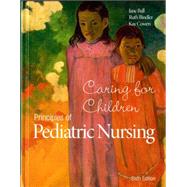Principles of Pediatric Nursing: Caring for Children is intended for use in pediatric nursing courses in associate and baccalaureate degree programs. It may also be helpful for practicing nurses working on hospital units and in health centers.
¿
Written to prepare today’s student for excellence in nursing, Principles of Pediatric Nursing presents a foundation of core pediatric nursing principles with an emphasis on growth and development, family-centered care, and health promotion and maintenance. The book integrates research, clinical reasoning, and evidence-based practice to help readers make connections between classroom and clinical situations. This edition empowers students to move beyond rote memorization of facts. Clinical reasoning and problem-solving principles helpreaders develop their clinical judgment so that they can learn to apply information as nursing practice continues to develop.
¿
Principles of Pediatric Nursing is available packaged with MyNursingLab®, an online homework, tutorial, and assessment program that engages students in learning. It helps students review, remember, and then apply key concepts–resulting in better performance in the course–and provides educators with a dynamic set of tools for gauging individual and class progress.
¿
Students, if interested in purchasing this title with MyNursingLab, ask your instructor for the correct package ISBN. Instructors, contact your Pearson representative for more information.
¿
Teaching and Learning Experience
To provide a better teaching and learning experience, for both instructors and students, this program will help:
- Improve Results: MyNursingLab better prepares students for the classroom, and beyond.
- Develop Clinical Reasoning Skills for Today and Tomorrow: Readers are encouraged to think creatively and critically about nursing care.
- Identify the Unique Health Care Needs of Children: Children are not just “little adults”–readers will learn the important differences in provision of nursing care for children versus adults, as well as the health conditions that children commonly experience.
- Visualize Health Conditions: Real photos help bring important concepts to life.
¿
Note: You are purchasing the standalone text. MyNursingLab does not come automatically packaged with the text.







